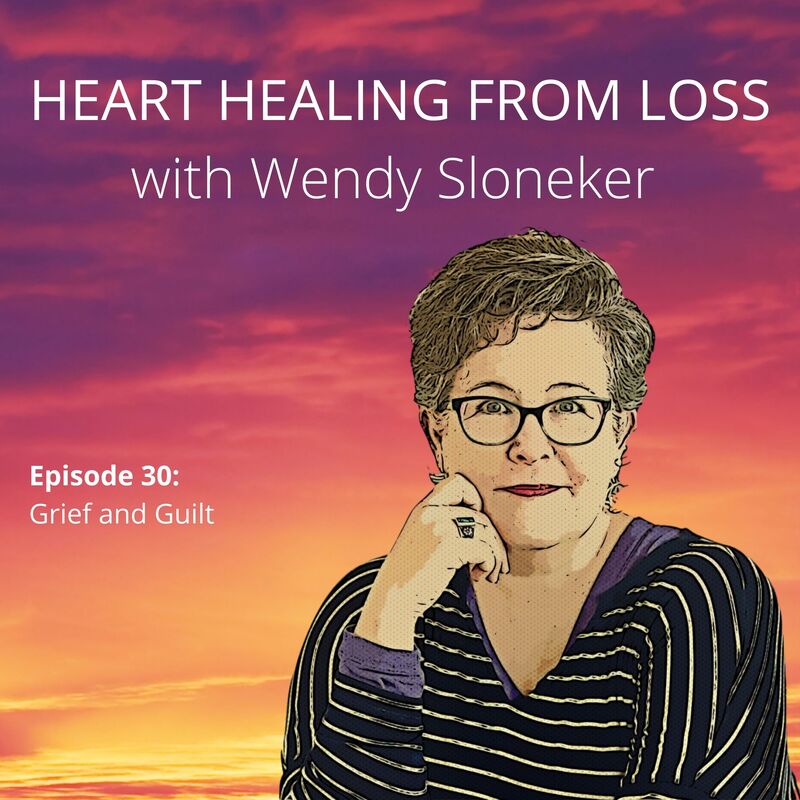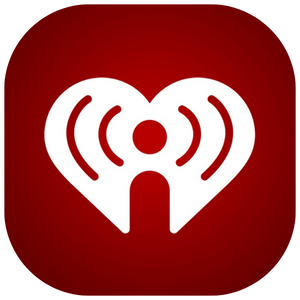Episode 30: Grief and Guilt
|
Last Interactions
In this episode, Wendy shares a story of a client whose last conversation with her mom didn't go well. And when her mom passed unexpectedly, the client was left with enormous grief — and guilt over that last interaction. In this time of COVID, it's possible many more people are discovering their most recent conversation with a loved one turned out also to be their last. |
You are Invited:
If, like this client, you or someone you know is carrying grief-with-a-side-of-guilt, please have a listen and share this episode. Then schedule a complimentary consultation with Advanced Grief Recovery Specialist Wendy at her website, HeartHealingFromLoss.com. It's time to let the healing begin.
If, like this client, you or someone you know is carrying grief-with-a-side-of-guilt, please have a listen and share this episode. Then schedule a complimentary consultation with Advanced Grief Recovery Specialist Wendy at her website, HeartHealingFromLoss.com. It's time to let the healing begin.
As seen on: |
|
Full Episode Transcript
Wendy Sloneker
You are listening to the heart healing from loss podcast with Wendy Sloneker. This is episode 30.
Hi, everybody. Welcome back, hey, something comes up frequently in my work with clients, and that is guilt, feelings of guilt, feeling guilty. And so I really want to cover this immediately. It was a topic in a Facebook video that I did long ago. And it's worth mentioning more often than I have because it comes up.
Often, I want to tell you a little story. Because there are things that we do in grief and when the feeling of guilt comes up. And what often happens is that we tend to as grievers take responsibility for things that honestly are likely to have been out of our control, or that we did not know about both have come up in the last two weeks. And so it was so good that I get to do a podcast recording right now. And I cover it you ready?
Okay. So here's the story. And really, it's kind of an aggregate of of a few things. But the base story goes something like this, there was a client that I was working with, and they had a death in their family, it was one of their parents that they were really close to, it was their mom, and they did not have a great exchange right before their mom died, didn't know, Mom was gonna die, all of a sudden, she had been found. And, and she had already passed. So this client of mine was suffering, truly and tremendously suffering, feelings of guilt, like she was really giving herself a mental and emotional thrashing every moment, feeling like she should have done better known something, been able to say something she didn't, she hated how the last exchange went with their mom.
Understandable, right? I have certainly as a person, as a human as a messy individual who has good moments and bad moments, I have had exchanges where I did not like how I left it, or I wish it would have gone a different way. Now, here's the thing. There was a lot about this person's parents death, that is still unknown, there was no autopsy, there was no understanding that the family had decided that that was not the route that they wanted to take.
So there was a lot, there's a lot that still unknown about exactly what happened to mom. And yet, my sweet client was really upset with herself for a long, long time, long before we ever started working together. So there are many different avenues to take on this. And I really would like to have you hear me when I offer the following. Because I know a lot of people out there are feeling feelings of guiltiness or feelings of guilt, they feel culpable, they feel responsible, they feel like they should have known or done something different or better or more. And in the case of of this client and the others that I've worked with, and I'm currently working with, I want to share that if there was any way that you would have known to have done something different or better or more that you would have taken.
So I just want to plant the seed. This may have been something you've heard from other loved ones who were seeing you suffer. And I want to go a little further. Because there's more of course there's more. hearing it from somebody else is not the same as what you're hearing from your own voice on the inside. So if you are someone who is working through something, the end of a relationship, the end of a job, maybe there was a death, maybe there's a divorce, that you're not excited about how it's going down, or how it's shaken out or how it's coming apart.
I want to offer you the following because chances are good there may be things about what's going on that you don't 100% know things out of your control that you are actually not responsible For. So I want to offer you some language that may be of relief sooner than later goes like this. What if instead of I just feel so guilty, I feel responsible, I feel culpable. I feel like it's my fault, or that it would have been easier if my actions had been different. I would like you to try the following thoughts on for yourself.
Ready, here we go. I hate how this is going, or I hate how it went, I wish it would have been different. It If I had known anything else that there was to do, I'd have 100% done it. And I don't know what that might have been. I don't know what that might have been. But it makes my heart hurt, that it went this way. What's happening there? What's coming up for you, but also what is happening in that phrase that is different. Instead of taking responsibility for something that you cannot possibly be responsible for, like the uncontrollable things that you maybe didn't see didn't know about, you're taking the judgment and blame off of yourself for things that would have been impossible for you to know, would have been impossible for you to have gathered or garnered just in your observation and awareness.
Now, this is especially true for well, humans, number one. And for those who have, perhaps you're a parent, or you're a care partner, or you're somebody who's just really close, who is always looking out for your person who you know, for whatever reason or purpose may have some special need, there are still things that you can't control as a care person, as a care partner, as a caregiver, even if you're your spouse, even if you're a parent, there are things that you are not responsible for, there are things that you cannot control, there are things about that other person, even the one that you is your beloved, that you don't know.
And I offer this as a way of like really coming to understand your wishes and dreams and the way your heart feels about how something transpired is not the same as you be like that doesn't automatically mean that you're responsible. Those are two different things. So I really am hopeful that you are hearing me in this and try it on. Try it on. Hey, I hate how that went. I hate that I didn't hug you. I feel sad that I let that happen. I wish I wouldn't have this is different than it was 100% me. And it's all my fault, which is sometimes just what our brain does. Grief is hard enough. Grief is hard enough.
So please try it on. I wish it had been different. And this is what we talk about too. In terms of unresolved grief. Grief is often an undelivered emotional communication or communication of an emotional nature. Okay, so it can be about change, it can also be about the halt of a familiar pattern or behavior. So somebody in your life if they have died, that is significant. This is also something that changes your identity. Who does this make me if I'm no longer this person's spouse, or partner, or daughter, who am I? This is identity work as well.
So all this to say is grief is hard enough without the add on, of feelings of guilt. Whether it's like real or imagined responsibilities, those feelings are really real. For me, guilt can often feel like I was just thinking about this while I was out walking my dog. It often feels like pre nausea. There's that moment before my mouth starts to salivate from nausea. And it just feels like my entire insides are very arid and dry and kind of scraped out and it feels like my mouth gets dry right before I get I start to salivate my lungs kind of feel tight and inside. There's also a kind of a heat that comes to my face and chest, that feels really close to shame, as well.
So these are feelings that are in my body that I can identify as, am I feeling guilty about something, and then I get to examine it, knowing your own personal physical somatic response is going to be useful. Sometimes we're aware of our feelings before we're aware of what our thinking is, there's nothing wrong there, my hope is, is that there may be a change to the language that you might use in terms of taking 100% responsibility for things that are 100%, outside of your control. Not possible, not possible, allowing yourself to feel and notice what you wouldn't have liked to have been different or better or more, or what your hopes dreams or expectations might have been. It's a path to healing. It's a path to healing the heart, yours. And so that's the language that I offer in terms of beginning to become aware and holding yourself.
Gently, as you examine a relationship or examine what transpired in terms of a death or a loss. This is how we gently do it. This is not about letting yourself off a hook of any kind. Or, you know, being nice to yourself, if you feel like you don't deserve it, that kind of stuff. This is about hey, let's just take a look.
And let's first also note, this is not what I anticipated. This is not what I wanted. I imagine this is very true for many of you out there who are listening, who were not able to be with your loved ones, if they had died of like in hospital, or from COVID or with you maybe being separated geographically, you might have really wanted to have been there. Hey, I hate that I wasn't I hate that I wasn't I don't hate myself for not being there. But I hate that I wasn't there. Or I really wish I would have these are different ways of giving yourself language that is gentle and exploratory, but will also let more emotion through in terms of why did I want that? Why was I hoping for that? What would I have said if I could have if I had known what would I have done? And forgiving yourself for not knowing to ask about something that was 100% not knowable for you at that time.
This is gentle work, and there is some nuance to it. But it's also really learnable really learnable skill. So my hope is you will try on some new language, rather than a repetitive loop that feels really bad. Because like I said earlier, grief is hard enough. I'm thinking about you.
I'm wishing you really well. Please connect with me when you're ready to pick up and work together closely about learning about grief, but also walking through it with practical activities. Just like the one I talked about just a minute ago.
Okay, hang in there. I'm thinking of you. And I'll speak with you again really soon. Okay, bye.
Hi, it's Wendy, thank you so much for listening. If something resonated or stuck out or sort of hummed with you in this episode, and you want to either talk more about it, or have me talk more about it, let's schedule a connection call. It could be that you are ready to learn how to release emotional pain. The sounds great. It's great to do and it's great on the other side.
Regardless, you're invited. So if you think it's time for a free 30 minute connection call, I would love to have that with you. Go to Wendy at hearthealingfromloss.com to email and schedule or you can text or call 206-498-8025 and schedule it that way. I would love to talk with you and I would love to listen to you too.
Thank you and thanks for coming back for the next episode too.
You are listening to the heart healing from loss podcast with Wendy Sloneker. This is episode 30.
Hi, everybody. Welcome back, hey, something comes up frequently in my work with clients, and that is guilt, feelings of guilt, feeling guilty. And so I really want to cover this immediately. It was a topic in a Facebook video that I did long ago. And it's worth mentioning more often than I have because it comes up.
Often, I want to tell you a little story. Because there are things that we do in grief and when the feeling of guilt comes up. And what often happens is that we tend to as grievers take responsibility for things that honestly are likely to have been out of our control, or that we did not know about both have come up in the last two weeks. And so it was so good that I get to do a podcast recording right now. And I cover it you ready?
Okay. So here's the story. And really, it's kind of an aggregate of of a few things. But the base story goes something like this, there was a client that I was working with, and they had a death in their family, it was one of their parents that they were really close to, it was their mom, and they did not have a great exchange right before their mom died, didn't know, Mom was gonna die, all of a sudden, she had been found. And, and she had already passed. So this client of mine was suffering, truly and tremendously suffering, feelings of guilt, like she was really giving herself a mental and emotional thrashing every moment, feeling like she should have done better known something, been able to say something she didn't, she hated how the last exchange went with their mom.
Understandable, right? I have certainly as a person, as a human as a messy individual who has good moments and bad moments, I have had exchanges where I did not like how I left it, or I wish it would have gone a different way. Now, here's the thing. There was a lot about this person's parents death, that is still unknown, there was no autopsy, there was no understanding that the family had decided that that was not the route that they wanted to take.
So there was a lot, there's a lot that still unknown about exactly what happened to mom. And yet, my sweet client was really upset with herself for a long, long time, long before we ever started working together. So there are many different avenues to take on this. And I really would like to have you hear me when I offer the following. Because I know a lot of people out there are feeling feelings of guiltiness or feelings of guilt, they feel culpable, they feel responsible, they feel like they should have known or done something different or better or more. And in the case of of this client and the others that I've worked with, and I'm currently working with, I want to share that if there was any way that you would have known to have done something different or better or more that you would have taken.
So I just want to plant the seed. This may have been something you've heard from other loved ones who were seeing you suffer. And I want to go a little further. Because there's more of course there's more. hearing it from somebody else is not the same as what you're hearing from your own voice on the inside. So if you are someone who is working through something, the end of a relationship, the end of a job, maybe there was a death, maybe there's a divorce, that you're not excited about how it's going down, or how it's shaken out or how it's coming apart.
I want to offer you the following because chances are good there may be things about what's going on that you don't 100% know things out of your control that you are actually not responsible For. So I want to offer you some language that may be of relief sooner than later goes like this. What if instead of I just feel so guilty, I feel responsible, I feel culpable. I feel like it's my fault, or that it would have been easier if my actions had been different. I would like you to try the following thoughts on for yourself.
Ready, here we go. I hate how this is going, or I hate how it went, I wish it would have been different. It If I had known anything else that there was to do, I'd have 100% done it. And I don't know what that might have been. I don't know what that might have been. But it makes my heart hurt, that it went this way. What's happening there? What's coming up for you, but also what is happening in that phrase that is different. Instead of taking responsibility for something that you cannot possibly be responsible for, like the uncontrollable things that you maybe didn't see didn't know about, you're taking the judgment and blame off of yourself for things that would have been impossible for you to know, would have been impossible for you to have gathered or garnered just in your observation and awareness.
Now, this is especially true for well, humans, number one. And for those who have, perhaps you're a parent, or you're a care partner, or you're somebody who's just really close, who is always looking out for your person who you know, for whatever reason or purpose may have some special need, there are still things that you can't control as a care person, as a care partner, as a caregiver, even if you're your spouse, even if you're a parent, there are things that you are not responsible for, there are things that you cannot control, there are things about that other person, even the one that you is your beloved, that you don't know.
And I offer this as a way of like really coming to understand your wishes and dreams and the way your heart feels about how something transpired is not the same as you be like that doesn't automatically mean that you're responsible. Those are two different things. So I really am hopeful that you are hearing me in this and try it on. Try it on. Hey, I hate how that went. I hate that I didn't hug you. I feel sad that I let that happen. I wish I wouldn't have this is different than it was 100% me. And it's all my fault, which is sometimes just what our brain does. Grief is hard enough. Grief is hard enough.
So please try it on. I wish it had been different. And this is what we talk about too. In terms of unresolved grief. Grief is often an undelivered emotional communication or communication of an emotional nature. Okay, so it can be about change, it can also be about the halt of a familiar pattern or behavior. So somebody in your life if they have died, that is significant. This is also something that changes your identity. Who does this make me if I'm no longer this person's spouse, or partner, or daughter, who am I? This is identity work as well.
So all this to say is grief is hard enough without the add on, of feelings of guilt. Whether it's like real or imagined responsibilities, those feelings are really real. For me, guilt can often feel like I was just thinking about this while I was out walking my dog. It often feels like pre nausea. There's that moment before my mouth starts to salivate from nausea. And it just feels like my entire insides are very arid and dry and kind of scraped out and it feels like my mouth gets dry right before I get I start to salivate my lungs kind of feel tight and inside. There's also a kind of a heat that comes to my face and chest, that feels really close to shame, as well.
So these are feelings that are in my body that I can identify as, am I feeling guilty about something, and then I get to examine it, knowing your own personal physical somatic response is going to be useful. Sometimes we're aware of our feelings before we're aware of what our thinking is, there's nothing wrong there, my hope is, is that there may be a change to the language that you might use in terms of taking 100% responsibility for things that are 100%, outside of your control. Not possible, not possible, allowing yourself to feel and notice what you wouldn't have liked to have been different or better or more, or what your hopes dreams or expectations might have been. It's a path to healing. It's a path to healing the heart, yours. And so that's the language that I offer in terms of beginning to become aware and holding yourself.
Gently, as you examine a relationship or examine what transpired in terms of a death or a loss. This is how we gently do it. This is not about letting yourself off a hook of any kind. Or, you know, being nice to yourself, if you feel like you don't deserve it, that kind of stuff. This is about hey, let's just take a look.
And let's first also note, this is not what I anticipated. This is not what I wanted. I imagine this is very true for many of you out there who are listening, who were not able to be with your loved ones, if they had died of like in hospital, or from COVID or with you maybe being separated geographically, you might have really wanted to have been there. Hey, I hate that I wasn't I hate that I wasn't I don't hate myself for not being there. But I hate that I wasn't there. Or I really wish I would have these are different ways of giving yourself language that is gentle and exploratory, but will also let more emotion through in terms of why did I want that? Why was I hoping for that? What would I have said if I could have if I had known what would I have done? And forgiving yourself for not knowing to ask about something that was 100% not knowable for you at that time.
This is gentle work, and there is some nuance to it. But it's also really learnable really learnable skill. So my hope is you will try on some new language, rather than a repetitive loop that feels really bad. Because like I said earlier, grief is hard enough. I'm thinking about you.
I'm wishing you really well. Please connect with me when you're ready to pick up and work together closely about learning about grief, but also walking through it with practical activities. Just like the one I talked about just a minute ago.
Okay, hang in there. I'm thinking of you. And I'll speak with you again really soon. Okay, bye.
Hi, it's Wendy, thank you so much for listening. If something resonated or stuck out or sort of hummed with you in this episode, and you want to either talk more about it, or have me talk more about it, let's schedule a connection call. It could be that you are ready to learn how to release emotional pain. The sounds great. It's great to do and it's great on the other side.
Regardless, you're invited. So if you think it's time for a free 30 minute connection call, I would love to have that with you. Go to Wendy at hearthealingfromloss.com to email and schedule or you can text or call 206-498-8025 and schedule it that way. I would love to talk with you and I would love to listen to you too.
Thank you and thanks for coming back for the next episode too.






